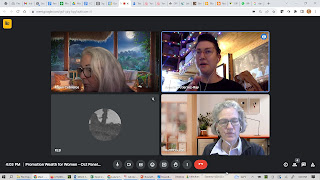The Women In Coffee Project extended their webinar series on "Wealth for Women in Coffee" with this week's panel discussion on "For-Profit Solutions" for improving producer prosperity.
The panelists were Phyllis Johnson, founder of BD Imports, Jeanine Niyonzima-Aroian, founder of JNP Coffee and me, Ruth Ann Church, founder of Artisan Coffee Imports. The moderator, Amaris Gutierrez-Ray, is the founder of Women in Coffee Project and the lead roaster and coffee buyer at Joe Coffee in New York City.
Each of the three panelists addressed at least one specific pro-women activity that their for-profit company continues as part of the mission.
1. Ruth Ann shared described how Artisan was started in 2009 buys and markets the women's coffee, which encourages the cooperatives to support the women and helps them have more visibility. For example, Artisan has the president of the women's group sign the contract, which many of them have never done. Having a woman in the meetings where contracts are signed between the cooperative and a buyer has important symbolism. Often, women would not be seen in such meetings.
Ruth Ann also shared about the $.136/lb premium that Artisan pays. This is called an unconditional cash transfer (UCT) in development circles. UTCs have been proven to be effective tools for development, especially when given to women, compared to other forms of development aid such as building a school or a health clinic. The reason is that with cash, a woman has the freedom to apply the money where it's most needed. If the family most needs to buy food, she uses the money that way. If she decides it will go to school fees or a new cement floor for the home, that is also possible.
2. Jeanine shared exciting on-the-ground achievements of JNP Coffee in Burundi, (also founded in 2009) such as increasing the quality over the years to gain higher prices to such an extent that the men in the communities are asking how they can join the IWCA Burundi chapter! Many of them now participate enthusiastically and they receive the premiums and good prices from JNP also.
Jeanine also shared the impressive story of how impactful micro-savings and micro-credit programs have been. JNP helped the women start a micro-savings program when they came to her asking for financial help to build their own washing station. Four years later, they have saved the money they need themselves, and they are now the pround owners of a washing station!
3. Phyllis summarized her experiences and truly inspired everyone on the call with her comments. Phyllis started BD Imports in 1999 with importing coffee from Kenya. Since then she has imported from Burundi, Rwanda, Tanzania, Guatemala, Costa Rica, Nicaragua and now she is focused on Brazilian imports and sourcing from racial minority producers there.
Her watch-word to the group was to "keep a big tent with you." In other words, understand that it is a village of people who help us along the way in the coffee industry. No one is a singular hero or heroine.
Phyllis wants to change the negative connotation and definition of the word "middleman" in coffee. She emphasizes to roasters that if it wasn't for the "women in the middle" there wouldn't be coffee! You just don't hear about them very often. "The work that's happening in the middle is wholesome work. It's the work we need to be doing, so women are doing it."
To bring it to a close, Amaris, the moderator, reflected what everyone was thinking after Phyllis' stirring talk: "I think I've been to coffee church!"
Hopefully, the panel gave those who listened on Oct. 2 and those who can catch the YouTube Recording, inspiration to continue pursuing for-profit solutions in coffee to benefit producers.


No comments:
Post a Comment